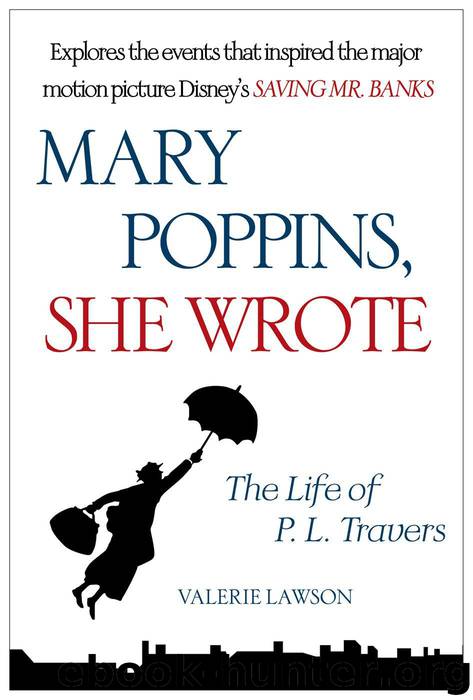Mary Poppins, She Wrote: The Life of P. L. Travers by Lawson Valerie

Author:Lawson, Valerie [Lawson, Valerie]
Language: eng
Format: azw3, epub
Publisher: Simon & Schuster
Published: 2013-12-02T16:00:00+00:00
11
Monsieur Bon Bon Says Au Revoir
She posed for a snapshot at the door of Pound Cottage in her gingham skirt, layered and frilled in the Navajo style. Pamela seemed the epitome of happy motherhood, a young matron from the pages of a summer fashion catalogue. In her arms was Camillus, his arms entwined behind her neck. She called him “my treasure,” made him drink up all his milk at lunchtime, read him Squirrel Nutkin and Peter Rabbit, worried about his education and decided it must be good, it must be proper. She had gone to the Allora Public School and a college for young ladies in Sydney. He would attend the French school in South Kensington, then Dane Court prep school in Surrey.
At times, Pamela still felt the westward pull of America. It was bracing there. In a piece for the New English Weekly, “Notes on a Homecoming,” she contrasted the United States, vibrant, electric, with sleepy England. America took measurements, asked everything, waited for nobody. England, after the war, made no demands, asked no questions, was without curiosity. England was “heavy and intimate, soft, but firm at the core; sluggish, forever waiting, half asleep on her feet at the crossroads.” Pamela felt a stranger in this stoic, mustn’t grumble land.1
She beat Jessie back to the offices of the New English Weekly by one day. From the quarantine hospital in Liverpool, Pamela had written to the Weekly’s editor, Philip Mairet, asking whether she should resign. She explained something of the tension between Jessie and herself. In any dispute, she had the weaker hand; after all, Jessie owned the New English Weekly. Its masthead listed the editorial committee as “Jessie R. Orage (sole proprietor), Maurice B. Reckitt, Pamela Travers, T. S. Eliot, W. T. Symons and T. M. Heron.”
“Getting in first is typical of Pam,” Jessie wrote in her diary. “When she saw him she said she had thought it over and would let it rest for a time. Philip wanted to know if I minded seeing her. Of course I said no, nor did I see any reason why she should resign or stop writing.” In October, an editorial board meeting was “a bit grim for me because of Pamela, and I was the first to leave although Philip and Symons expected me to dine after. But the thought of a whole evening of Pamela’s presence was too much. I preferred not to waste my emotions. When she came in she swarmed all over ‘Dear Philip.’‘Dear Travers.’ I nearly laughed.”
Pamela never relinquished her place on the board nor her role as a major contributor. From 1945 until 1949, when the Weekly collapsed, she wrote for almost every issue under the bylines P. L. Travers, PLT, or Milo Reeve. In all these pieces, Pamela’s tone was confident, superior, as she reviewed films and books, but mainly theatre. Jessie occasionally objected to remarks in her reviews, with Mairet forever playing the diplomat.
Just before Christmas 1945, Jessie and her children moved into the bottom half of a house in Oakley Street, Chelsea.
Download
Mary Poppins, She Wrote: The Life of P. L. Travers by Lawson Valerie.epub
This site does not store any files on its server. We only index and link to content provided by other sites. Please contact the content providers to delete copyright contents if any and email us, we'll remove relevant links or contents immediately.
| Crime & Criminals | LGBT |
| Special Needs | Women |
We're Going to Need More Wine by Gabrielle Union(18128)
Bombshells: Glamour Girls of a Lifetime by Sullivan Steve(13161)
Pimp by Iceberg Slim(13004)
The Radium Girls by Kate Moore(10969)
Becoming by Michelle Obama(9330)
The Girl Without a Voice by Casey Watson(7297)
Educated by Tara Westover(7122)
Wiseguy by Nicholas Pileggi(4657)
The Wind in My Hair by Masih Alinejad(4460)
Hitman by Howie Carr(4409)
On the Front Line with the Women Who Fight Back by Stacey Dooley(4336)
Hunger by Roxane Gay(4261)
Year of Yes by Shonda Rhimes(4153)
The Rules Do Not Apply by Ariel Levy(3954)
The Borden Murders by Sarah Miller(3623)
Papillon (English) by Henri Charrière(3330)
Joan of Arc by Mary Gordon(3303)
Patti Smith by Just Kids(3262)
How to be Champion: My Autobiography by Sarah Millican(3217)
